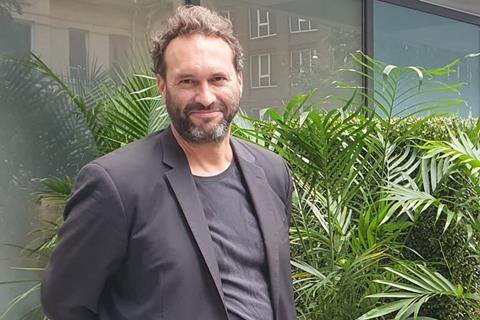
Charades CEO Yohann Comte co-founded the Paris-based sales and production outfit in 2017 alongside Carole Baraton and Pierre Mazars, after several years as deputy head of sales at Gaumont.
The trio and their 12-strong team have become a tour de force on the international film market and Comte divides his time between his poolside Paris headquarters, home office in Tallinn in Estonia and the international festival circuit.
Charades was at Venice with Timm Kröger’s competition film The Theory Of Everything, Sebastien Vanicek’s Vermin and Karan Tejpal’s Stolen, and is now in Toronto with rural horror When Evil Lurks and Niclas Larsson’s Mother, Couch.
Upcoming projects include Ricardo Curtis and Rodrigo Perez-Castro’s €15m CGI animation “about very incompatible species of animals who have to team up and find a way out of their zoo when it’s being invaded by an extra-terrestrial presence,” says Comte. “When I think about it, it’s a bit like Cannes residents during the festival.”
What is your Paris office like?
We are about to move into new offices located in Montmartre right by the cinema school La Fémis. There’s no assigned desk, but there are multiple dedicated spaces so all team members feel they have their own. Also, there’s an outdoor pool, which will also be an extension of our office.
What is the first thing you do when you arrive in your office each day?
I am based in Tallinn where my daughter lives so I am mostly doing home office and I come to our Paris office as often as I can.
Who do you look up to in the industry and why?
People who break the boundaries between business and art, producers who write, directors who understand what an MG is, distributors who trust their emotions as much as box-office figures.
Who helped you most when you were first starting out?
I owe my sales career to Raphael Berdugo [Roissy Films at the time, now Orly Films] and Cecile Gaget [Gaumont at the time, now Wild Bunch]. Raphael showed me there were as many types of sales agents as there are types of buyers, and that inspiring trust and being gentle was as effective, maybe more, as being aggressive and pressuring. Cecile was convinced we had to be as close as possible to talents and that sales was about creativity as much as negotiation.
What was your favourite film growing up?
My mother, brother and I went to the video club every Friday night and we would rent six films. We would watch five films over the weekend and debrief them over Sunday night dinner before watching the sixth one together. When I was nine, I remember Dead Poets Society. When I was 18, it was Titanic. I grew up in a small town where we didn’t have access to arthouse films, so my love for them came later.
What do you like best about your job?
Being surprised by a film.
Of what are you most proud professionally?
Going to the Oscars with Charades’ first animated feature Mirai from Mamoru Hosoda, the director I have worked with the most.
What’s the biggest professional mistake you have made?
Partying sometimes too much, thinking escaping would help me to handle an unbearable level of stress and pressure. There’s a benefit in growing older, the price you pay in the morning becomes higher than what you can afford.
What is your favourite festival?
Annecy, which has brought the company three Cristal awards for best film in five years and two Oscar-nominated films. And so much joy, great dinners, surprises, time for improvisation and spontaneity.
What do you think the film sales sector will look like five years from now?
A sales agent is a curator. Wherever the business goes, there will always be the need for people to select and bring films to independent distributors and festivals. The job is evolving towards much more time and resources being dedicated to organising the best international launch and coordinated distribution rather than purely selling. Sales agents will become more indie international distributors.
What excites you about the future of the industry?
Finally, the theatrical experience is driving the business again and is back at being the home for discoveries.
What is the biggest challenge facing the industry?
Bringing a younger audience to theatres to watch innovative, disruptive foreign films.
If you didn’t work in this industry, what job what you do?
I’d probably work in the wine business in Burgundy.
Who would play you in the biopic film of your life and who would direct it?
Certainly not an AI nor directed by an AI.

























No comments yet